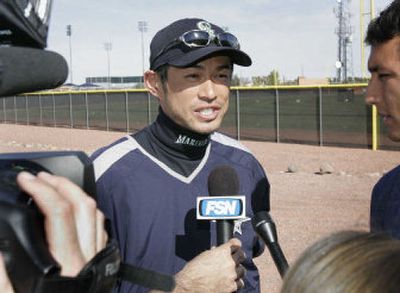Tricky translation

Five years ago, a reporter asked Ichiro Suzuki a question and he launched into a lengthy response, in Japanese, to his translator. After nearly 30 seconds, the translator turned to the reporter and said:
“He says, ‘Yes, of course.’ “
“That’s it?” the reporter responded. “He said all that for, ‘Yes, of course?’ “
That’s the way it goes sometimes when players’ comments are translated, whether it’s from Japanese to English or Spanish to English or Texan to English. The answers sometimes seem watered-down or just plan weird, to the point that you wonder if the translation has twisted the meaning of the question, or the answer, or both.
Fortunately for us reporters, Ichiro has been a little more long-winded lately. He hasn’t, however, been any less difficult to understand.
In the past few weeks he has talked his way around one question on moving to center field and raised plenty of eyebrows with another on what he believes the Mariners need to win the American League West. Earlier, he maintained an unrevealing air when describing such things as a line drive that got over his head in San Diego or the reason he has stolen more bases.
Need a direct answer out of Ichiro? Good luck. Even with a translator, sometimes it takes another translator to figure out what Ichiro really is saying. With that in mind, I’ve dragged out my Ichiro-to-plain-English dictionary to reveal the meaning behind the mysterious words.
“
When Ichiro spoke at the All-Star Game of the Mariners’ inconsistent season, he said:
“The problem usually isn’t just on the cover. You need to look much deeper. For example, if we’re talking about a tree and the tree has a problem, you need to look at the root. But you cannot see the root. The mistake is to keep watering the fruit. That’s not going to solve anything. You need to find where the problem is first.”
What he really meant was: “Hey, not my problem this team can’t win this lousy division. Talk to the front-office, dude. And while you’re at it, can you see how deep the pockets are for my next contract after the 2007 season?”
Either that, or: “We need a new groundskeeper at Safeco Field. I sense through the nerve endings in my feet that the root system in right field is horrible.”
“
After his infamous stare-down with umpire Ted Barrett during the last homestand (Barrett said he swung and missed at strike three; Ichiro said he foul tipped the pitch), Ichiro was insulted. He said:
“I stared at him because I like him so much. If I had missed the ball, I would have run to first base. For him to say what he did is to say that I’m lying. I’m disappointed and kind of sad that he found me as a player like that, that I would lie in a situation like that.”
What he really meant was: “I apologize that I might have shown up an umpire. That is not my style. And in suggesting he is calling me a liar, I may have labeled him as one, too. For that I am deeply sorry.”
Either that, or: “Dude, I’m a superstar. Calls go my way.”
“
When Ichiro was asked how close he came to catching a line drive that flew over his head in San Diego, he said:
“It was as you saw it.”
What he really meant was: “Are you watching the same game I’m playing? Do you honestly believe that Ichiro would not reach a ball that was catchable? The only way I catch that ball is if I were playing center field. And we all know the chances of that ever happening.”
“
When a reporter last month asked the reason he has stolen more bases this season, Ichiro said:
“It is because I am wearing my pants higher and showing my socks. It makes me run faster.”
What Ichiro really meant was: “Well, it’s the socks AND the fact that I’d get chewed on by Mike Hargrove if I didn’t run more aggressively this year. And if I wore my underwear outside my uniform, I could go even faster.”
“
As his hitting slump in April turned into a hot streak in May, Ichiro was asked if his swing was getting where he wanted it. He followed the question with a question:
“When has it never been where I wanted it?”
The writer’s response: “Maybe when you were hitting .177?”
(silence)
What Ichiro really meant was: “Are you watching the same game I’m playing? Do you honestly believe that Ichiro would not hit the ball again? Have I not proven to you that I can get 200 hits a season with my eyes closed, even if I have to drop 10 bunts with a man on second and two outs to do it?”
“
On the day center fielder Jeremy Reed broke his thumb attempting a diving catch in right-center, Ichiro was asked if he would consider moving to center until Reed returned. What he said was:
“I have not been asked.”
What Ichiro really meant was: “They couldn’t get me to move two steps toward center before that ball was hit. No way I’m going all the way over there.”
Or, “You think the root system is bad in right, try standing in center. No thanks.”